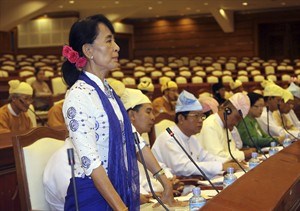
Myanmar's Opposition leader Aung San Suu Kyi speaks as she asks a question during a regular session of the parliament at Myanmar Lower House on Wednesday, July 25, 2012, in Naypyitaw, Myanmar. (AP Photo/Khin Maung Win)
July 25, 2012 - 7:50 AM
NAYPYITAW, Myanmar - Myanmar opposition leader Aung San Suu Kyi used her first speech in parliament Wednesday to call for laws protecting the rights of the country's impoverished ethnic minorities.
The Nobel Peace Prize winner and democracy crusader won her first seat in Myanmar's parliament in a historic April byelection that was seen as a key step in the country's transformation from military rule to fledgling democracy.
Suu Kyi stood from her seat toward the back of Myanmar's parliament to call for an end to discrimination against ethnic minorities as part of the "emergence of a genuine democratic country."
"Based on the spirit of equality, mutual respect and understanding," she said, "I would like to urge all lawmakers to enact necessary laws or amend laws to protect the rights of ethnic nationalities."
Suu Kyi's comments came in support of a motion by a ruling-party lawmaker from the ethnic Shan state on upholding ethnic minority rights. She referred to soaring poverty rates in Chin, Kachin, Shan and Rakhine states, noting that protecting minority rights required more than just maintaining ethnic languages and cultures.
"The high poverty rates in ethnic states clearly indicate that development in ethnic regions is not satisfactory — and ethnic conflicts in these regions have not ceased," she said during her brief speech.
Suu Kyi did not mention last month's communal violence in western Myanmar between Rakhine Buddhists and Muslim Rohingyas that left at least 78 people dead and prompted a government crackdown in the region.
The Nobel Peace Prize winner has faced rare criticism from rights groups for not offering stronger support for the Rohingya, who are considered by most in Myanmar to be illegal immigrants from Bangladesh and are not one of the recognized ethnic groups of Myanmar.
The United Nations says there are about 800,000 Rohingya in Myanmar and considers them to be among the most persecuted people in the world.
Suu Kyi's pro-democracy movement has long been loosely allied with most of the country's dozen or so major ethnic minority groups, who, like her opposition party, also faced repression under the previous military regime.
Many of the ethnic groups fought bitter civil wars for greater autonomy, some of which lasted decades.
Since taking office last year, President Thein Sein has rolled back many of the repressive actions of the military regimes that preceded him. His military-allied government has reached cease-fires with several ethnic rebel groups, but fighting has continued with Kachin rebels that threatens the ongoing reform and reconciliation process. Rights groups say an estimated 10,000 have been displaced in northern Kachin state.
News from © The Associated Press, 2012